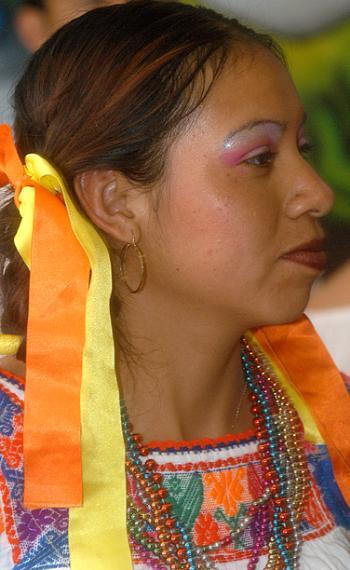
News
Summers Will Not Finish Semester of Teaching as Harvard Investigates Epstein Ties

News
Harvard College Students Report Favoring Divestment from Israel in HUA Survey

News
‘He Should Resign’: Harvard Undergrads Take Hard Line Against Summers Over Epstein Scandal

News
Harvard To Launch New Investigation Into Epstein’s Ties to Summers, Other University Affiliates

News
Harvard Students To Vote on Divestment From Israel in Inaugural HUA Election Survey
Mexican Workers Stage Complaints
United Students Against Sweatshops hosts performance

NEW YORK—An ape of a man with slick black hair and a purple shirt jumps up next to a gun-slinging bandit, the two of them swinging red plastic mallets at young men and women who scatter frantically.
A crowd of about 50 gathered Tuesday night at the Brecht Forum in Manhattan to watch the scene from “The Other Story of King Kong,” a performance hosted by United Students Against Sweatshops (USAS), a five-year-old student activist group of which Harvard’s Progressive Student Labor Movement (PSLM) is a founding member.
The setting of the show is the Kukdong apparel factory in Puebla, Mexico. The man in purple is King Kong, representing the evil factory owner, and the bandit is one of the “charros,” the leaders of the “gangster union.” The caricatures represent the attack on employees who went on strike at Kukdong in December 2000 to establish the first ever workers’ union in a Mexican maquiladoro, or sweatshop.
The Korean-owned factory produces Harvard-licensed Nike apparel.
The actors in the performance are mostly workers from Kukdong who participated in the strike that forced management to raise wages and improve conditions at the factory. The theater group is touring the United States to raise awareness about working conditions in Mexico.
The union victory at Kukdong factory, also known as MexMode, is the first and only one among the 3,000 maquiladoros in Mexico in their 30-year history, according to Jeff Hermanson, a senior adviser with the AFL-CIO, which provided the workers with food, water and transportation during their three-day strike.
He said a student delegation that traveled to Mexico to examine factory conditions and meet with workers sparked the beginning of the union movement in October 2000.
“I believe that that meeting stimulated the thoughts of these workers to organize themselves,” Hermanson said.
Hermanson credited the members of USAS with pressuring sneaker companies like Nike and Reebok to in turn pressure factory owners to allow unions.
That success has already inspired changes elsewhere. A similar strategy of student intervention throughout a five-year period helped lead to a labor agreement at the BJ&B factory in the Dominican Republic in March.
Ignacio Hernandez, secretary-general of the union that helped win the concessions at BJ&B, spoke before the performance at the Brecht Forum about the importance of a broad base of support.
“If everybody puts in their little grain of sand, then yes, it can be accomplished,” he said through a translator.
Hermanson said the victories at Kukdong and BJ&B will serve as a “wedge to raise standards in the entire apparel industry.” The establishment of unions “is growing geometrically,” he said, citing organizing efforts at factories in Bangladesh, Indonesia and Korea.
Supporters say the success at Kukdong is an early step towards establishing decent working conditions in the developing world, particularly because monitoring groups like the Workers’ Rights Consortium (WRC) aren’t strong enough, according to Emma S. MacKinnon ’05, a member of PSLM who helped organize the event.
“Every [Harvard] sweatshirt is still potentially made in this type of factory,” said MacKinnon, who is also a Crimson editor.
Groups like the WRC investigate working conditions. mediate between workers and employers and ensure that production does not shift away from factories that have unionized, MacKinnon said.
Harvard has refused to join the WRC, despite repeated pressures from PSLM.
The University belongs instead to the Fair Labor Association (FLA), a similar organization established by the Clinton administration to serve the same purpose but which consults with the corporations that own the factories—one of the reasons Harvard joined, according to University spokesperson Kevin Casey.
PSLM says the organization will never achieve any significant change, precisely because of WRC’s ties with the corporations.
“Harvard felt that industry representation in finding solutions to these problems was important,” Casey said.
He added that since the University joined the FLA in 1999, the organization has improved its transparency in making public the findings of factory inspections. In May, PSLM again called on the University to join the WRC, saying membership in the FLA was not enough.
Casey said the “competetive” relationship between the two monitoring groups has diminished, and for this reason University officials “haven’t closed the door at all to potentially joining the WRC.”
—Staff writer David B. Rochelson can be reached at rochels@fas.harvard.edu
Want to keep up with breaking news? Subscribe to our email newsletter.
